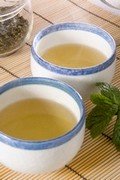Solving problems every tea drinker faces.
Exclusive subscriber benefits:
Receive four FREE quality ebooks worth $60
-
Save at least $5 during your first purchase
For many of my Western friends, oolong tea sounds exotic. I get many questions like:
"What are its health benefits?"
"Does is it help to lose weight"
The answer is, of course, yes! Provided you buy quality, it has all these beneficial properties. When you finished this article, you will know many of these health benefits are evidenced by scientfic research.
However, before we delve into them, let's get some perspective first.
Firstly, oolong tea is not some rare, mysterious tea, it has been around for thousands of years. Compared to green tea, it uses more mature leaves that are oxidized more to get richer, more complex aroma and flavors.
Secondly, compared to green tea (unoxidized) and black tea (fully oxidized), oolong tea is the most complex type of tea to unravel. There are many varieties, ranging from the lightly to heavily oxidized. They can taste very different! It is important to know what to look for.
Okay, we will cover one point at a time, here we go!
Oolong Tea Health Benefits #1:
Act as
antioxidants.
 Free radicals are linked to many signs of aging, including wrinkles, dark spots and certain
diseases, even cancers. They are everywhere - in the air we breathe, the food we eat and even the
sunlight.
Free radicals are linked to many signs of aging, including wrinkles, dark spots and certain
diseases, even cancers. They are everywhere - in the air we breathe, the food we eat and even the
sunlight.
Tea contains antioxidants that mop up the free radicals before they can hurt us. Oolong tea contains full range of tea antioxidants such as catechins, thearubigin and theaflavin.
A 2003 study conducted by Kenichi Yanagimoto compares green tea, oolong tea and black tea for their antioxidant activities.
He found green tea to be the most potent antioxidant, followed by oolong tea, then black tea.
Green tea blocked oxidation by almost 100% over 40 days. Oolong tea blocked oxidation by 50% over 15 days. Black tea showed only slight antioxidant activities.
Oolong Tea Health Benefits #2:
Promote
weight loss.
Oolong tea has a reputation for weight loss and rightly so.
Scientific studies have found that it does so by increasing metabolism, burning fat and blocking dietary fat absorption.
However, there is a lot of hype about what it can do, with some vendors claiming that it can help lose 2 pounds of weight a week.
In this article I cover some of the important questions people ask, including whether oolong tea is better than green tea in term of losing weight.
Ollong Tea Weight Loss - Frequently Asked Questions
Oolong Tea Health Benefits #3:
Promote heart
health.
 Oolong tea is good for the heart in several
ways.
Oolong tea is good for the heart in several
ways.
A 2007 American study found that it reduces blood concentrations of triglycerides (the most common form of fat that exists in the body) by a whopping 80% compared to rats on normal diet.
Another 2001 Japanese study found that it reduces cholesterol after 1 month of regular drinking.
A 2004 Japanese study conducted by Osaka City University found that oolong tea increases plasma adiponectin levels.
Low levels of plasma adiponectin are associated with obesity, type 2 diabetes mellitus and coronary artery disease (CAD).
The study concluded that oolong tea may have beneficial effects on the progression of atherosclerosis in patients with CAD.
Oolong Tea Health Benefits #4:
Treat skin
disorders.
Atopic dermatitis (AD) skin disease, or eczema, causes the skin to become red, flaky and itchy.
Mild forms of eczema can be treated. But many people suffer from what is called the recalcitrant AD, which does not respond to conventional treatment.
Green tea has been known to be anti-allergic. Perhaps drinking oolong tea can help?
A 2001 study conducted by Uehara from Shiga University found that drinking oolong tea is good for recalcitrant AD.
118 patients participated in the study. They maintained their dermatological treatment, but also drank 1 litre of oolong tea (made from 10 grams of leaves) a day. Beneficial effects were observed after 1 or 2 weeks.
63% of the patients showed marked to moderate improvements after 1 month.
Oolong Tea Health Benefits #5:
Complement diabetes
treatment.
 A 2003 Taiwanese
study found that drinking oolong tea is helpful to diabetes patients.
A 2003 Taiwanese
study found that drinking oolong tea is helpful to diabetes patients.
20 patients participated in the study. They suffered from type 2 diabetes and took the prescribed hyperglycemic drugs.
They drank either water or 1.5 litres of oolong tea daily for 30 days.
The scientists found that those who drank oolong tea experienced reductions in plasma glucose and fructosamine concentrations by 30% and 20% respectively. Those who drank water experienced no changes.
The scientists concluded that oolong tea complements oral agents in the treatment of type 2 diabetes.
Oolong Tea Health Benefits #6:
Reduce high blood
pressure.
A 2004 study by Yang found that drinking green and oolong tea for at least a year reduces high blood pressure.
Regular drinkers are 46% less likely to develop high blood pressure if they drink one-half to two-half cups a day.
They are 65% less likely to develop high blood pressure if they drink more than 2 cups a day.
Oolong Tea Health Benefits #7:
Inhibit bacteria.
Prevent tooth decay.
A 1993 study conducted by Nakahara found that oolong tea inhibits the enzyme activities of bacteria streptococci.
The bacteria has been known to cause dental plaque to form on teeth, which can lead to dental caries.
Nakahara examined green tea, oolong tea and black tea in his study. He concluded that oolong tea extract "exhibits the most prominent inhibitory action among various tea extracts".
So oolong tea does have significant health benefits. However, is oolong tea healthier to drink compared to green tea? Read the following article to find out!
Green Tea Versus Oolong Tea - Pros and Cons
Also, how do you decide which type of oolong tea to buy?
Loose Oolong Tea Varieties - The Four Great Schools
New! Comments: Like This Story? Leave A Comment!
References
Kenichi Yanagimoto, Hirotomo Ochi, Kwang-Geun Lee, and Takayuki Shibamoto (2003). Antioxidative Activities of Volatile Extracts from Green Tea, Oolong Tea, and Black Tea. J. Agric. Food Chem., 51 (25), 7396 -7401.
Uehara M, Sugiura H, Sakurai K (2001). A trial of oolong tea in the management of recalcitrant atopic dermatitis. Arch Dermatol. 2001 Jan;137(1):42-3.
Kazuaki Hosoda, Ming-Fu Wang, Mei-Ling Liao, Chin-Kuang Chuang, Miyuki Iha, Beverly Clevidence, and Shigeru Yamamoto (2003). Antihyperglycemic Effect of Oolong Tea in Type 2 Diabetes. Diabetes Care 26:1714-1718, 2003.
Yang YC et all (2004). The protective effect of habitual tea consumption on hypertension. Archives of Internal Medicine 164:1534-1540.
K Nakahara, S Kawabata, H Ono, K Ogura, T Tanaka, T Ooshima, and S Hamada (1993). Inhibitory effect of oolong tea polyphenols on glycosyltransferases of mutans Streptococci. Appl Environ Microbiol. 1993 April; 59(4): 968–973.
Shimada K, Kawarabayashi T, Tanaka A, Fukuda D, Nakamura Y, Yoshiyama M, Takeuchi K, Sawaki T, Hosoda K, Yoshikawa J. (2004). Oolong tea increases plasma adiponectin levels and low-density lipoprotein particle size in patients with coronary artery disease. Diabetes Res Clin Pract. 2004 Sep;65(3):227-34.
Related Articles
Green Tea Health Benefits - Too Good To Be True?
Green tea health benefits are like the many facets of a diamond. Can you imagine what it can do for you? Why it can unlock your life’s greatest potential...
White Tea Health Benefits - A Rising Star?
There are only a few 'proven' white tea health benefits, but they look very promising from here.
Back to Top of Oolong Tea Health Benefits
Back to Chinese Oolong Tea Main Page
Back to Amazing Green Tea Home
Solving problems every tea drinker faces.
Exclusive subscriber benefits:
Receive four FREE quality ebooks worth $60
Save at least $5 during your first purchase
Copyright� 2006-2025 Amazing-Green-Tea.com. All rights reserved.

